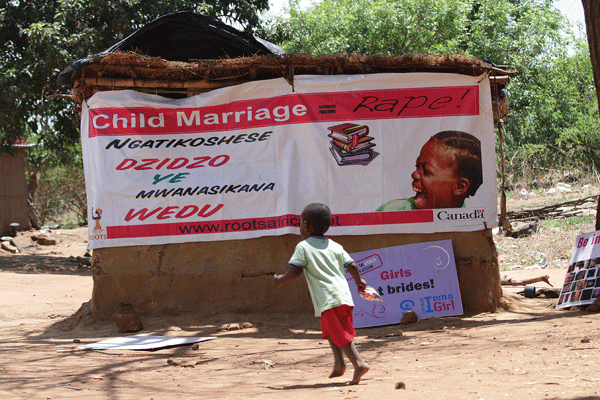
A recent report by the United Nations Women has revealed that poverty was driving underage girls into early marriages, exposing them to HIV and Aids.
BY VENERANDA LANGA
The report says girls from the poor households are more than four times likely to be married or be in a union before the age of 18 than their counterparts from richer backgrounds.
“Girls in child marriage are often taken by older men, who have had previous sexual partners,” the report read in part.
Worrying information gathered by the UN Women reveals that there is increased vulnerability to HIV faced by adolescents and young women, shown by the rapid increase in the proportion of young women infected with HIV by age group in the country.
“The proportion of young women infected with HIV in the 15 to 19 age group stands at 4,2% and it more than doubles for the next sub-group of 20 to 24 years to 10,6% (Zimbabwe Demographic and Health Survey, 2011),” the UN Women said.
“The spike in prevalence points to the need to protect young women, and harmful social practices such as child marriages have further exposed the girl child.”
- Chamisa under fire over US$120K donation
- Mavhunga puts DeMbare into Chibuku quarterfinals
- Pension funds bet on Cabora Bassa oilfields
- Councils defy govt fire tender directive
Keep Reading
UN Women country representative, Delphine Serumaga said research shows that child brides are at a relatively high risk of getting HIV due to their young age and physical immaturity, their limited power in negotiating safer sex with predominantly older husbands, who have had previous sexual partners, the frequency with which they have unprotected sex, and the pressure on them to demonstrate their fertility.
Child President, Tinaye Mbavari said in modern-day Zimbabwe, it was inappropriate that girls continued to be treated in the same way that their great-grandmothers were treated, being betrothed to husbands at a young age. “Our grandmothers were trained to be child bearing machines, but three generations later, we cannot continue to talk of girls, who have lost their youth to these three-headed beasts, who devour young girls around the world putting them into child marriages. Over 700 million women alive today were married as children before the age of 15,” he said.
Mbavari said marrying off a young girl does not solve any economic problems faced by a family.
“Forced marriages become a strategy for economic survival by families, as they marry off young girls to reduce their economic burdens, but the moment that husband abandons her, maybe then she has three children and what happens? It means that family has more problems with three more mouths to feed. The girl might also have been infected with HIV. If girls are educated, they are empowered and can become anything,”he said.
African Union goodwill ambassador for ending child marriages, Nyaradzai Gumbonzvanda, said, while it was commendable that Zimbabwe had demonstrated political will to end child marriages, girls were still being denied resources to get them educated.
“I am excited about the urgency of realigning our marriage laws to the Constitution because the response by Zimbabwe is not about legislation, but is about us putting clear articulation and commitment to end early child marriages,” she said.
Gumbonzvanda said Zimbabwe was a signatory to many conventions to protect girls, saying there was need to domesticate them and put resources into sectors that respond to ending child marriages.
The Danish embassy is one of the partners that have been assisting Zimbabwe to combat child marriages and Charge’ d Affaires Signe Skovbakke Winding Albjerg said, while there was need to focus on ending child marriages, there was also need to protect those girls who were already brides at a young age.
“There is need to offer them legal help, shelter and psychosocial support,” the Danish official said.
Vice-President Emmerson Mnangagwa, who has also taken the lead in the fight against child marriages, said although the government was crafting laws to criminalise the scourge and impose stiffer penalties on culprits, castration of men as punishment was not a good idea.
He said the government’s commitment to put an end to child marriages would soon be shown by crafting of one law to encompass all marriage laws and adequately deal with the issue of child marriages.
The chairperson of the Parliamentary Women’s caucus, Monica Mutsvangwa, said MPs should help by passing relevant laws to end child marriages and pass budgets that support girls.












